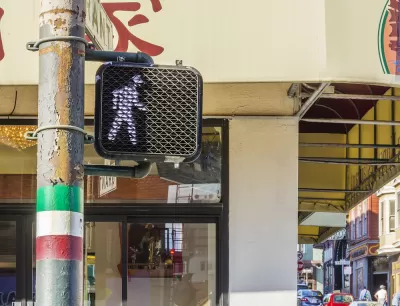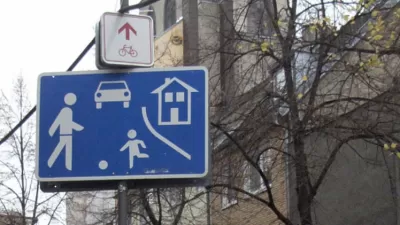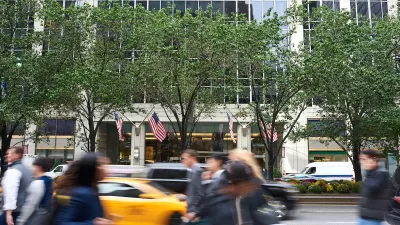Supporters of decriminalization argue that jaywalking laws don’t keep pedestrians safe and disproportionately burden Black and brown communities with fines.

As Jenni Bergal writes in an article for Stateline, some states are reconsidering jaywalking laws, fueling a fierce debate over the laws’ effectiveness and equity. According to Mike McGinn, executive director of America Walks, “[Enforcing jaywalking laws] doesn’t really improve safety. It’s part of a culture of blaming pedestrians.” Moreover, McGinn points out, “it’s used to make pretextual police stops that impinge on the ability of people to move about without being stopped, particularly in Black and brown communities.”
Thanks to arguments like these, “In the past two years, a few states have moved away from strict enforcement of jaywalking laws, making it easier for pedestrians to cross the street outside of a crosswalk or against a traffic signal without getting cited by police.”
Some critics disagree. “[A]t a time when pedestrian deaths are on the rise, opponents of decriminalization say police should be able to issue citations to discourage people from putting their lives in danger.”
Others say pedestrian safety is a matter of infrastructure, not individual behavior. “[T]he Insurance Institute for Highway Safety, a nonprofit research group funded by auto insurance companies, said the answer isn’t to go after jaywalkers; it’s to change the design of streets.” According to McGinn, “The real issue is that we need to design our streets so cars move slowly and carefully and we prioritize the safety of the people walking in their neighborhoods and business districts.”
The article details the recent legislation decriminalizing jaywalking in states like Nevada and Virginia, as well as the effort to pass a similar law in California.
FULL STORY: Racial Justice, Pedestrian Safety Fuel Jaywalking Debate

Maui's Vacation Rental Debate Turns Ugly
Verbal attacks, misinformation campaigns and fistfights plague a high-stakes debate to convert thousands of vacation rentals into long-term housing.

Planetizen Federal Action Tracker
A weekly monitor of how Trump’s orders and actions are impacting planners and planning in America.

San Francisco Suspends Traffic Calming Amidst Record Deaths
Citing “a challenging fiscal landscape,” the city will cease the program on the heels of 42 traffic deaths, including 24 pedestrians.

Defunct Pittsburgh Power Plant to Become Residential Tower
A decommissioned steam heat plant will be redeveloped into almost 100 affordable housing units.

Trump Prompts Restructuring of Transportation Research Board in “Unprecedented Overreach”
The TRB has eliminated more than half of its committees including those focused on climate, equity, and cities.

Amtrak Rolls Out New Orleans to Alabama “Mardi Gras” Train
The new service will operate morning and evening departures between Mobile and New Orleans.
Urban Design for Planners 1: Software Tools
This six-course series explores essential urban design concepts using open source software and equips planners with the tools they need to participate fully in the urban design process.
Planning for Universal Design
Learn the tools for implementing Universal Design in planning regulations.
Heyer Gruel & Associates PA
JM Goldson LLC
Custer County Colorado
City of Camden Redevelopment Agency
City of Astoria
Transportation Research & Education Center (TREC) at Portland State University
Jefferson Parish Government
Camden Redevelopment Agency
City of Claremont





























